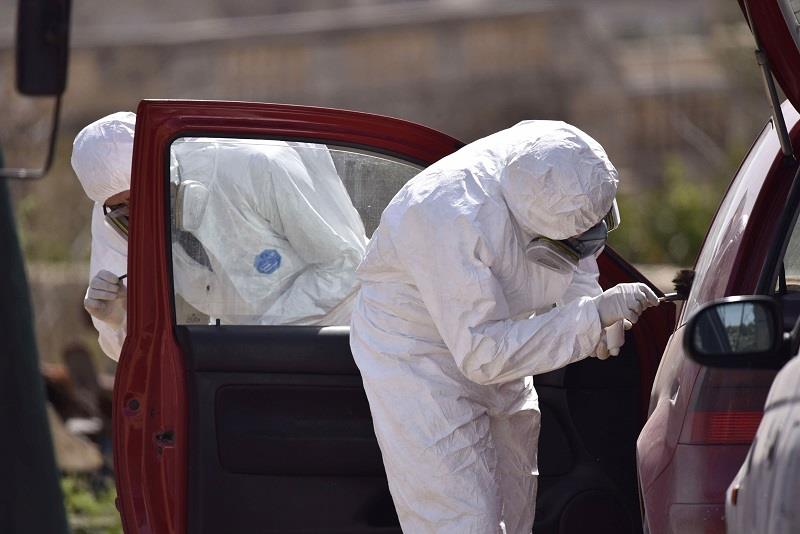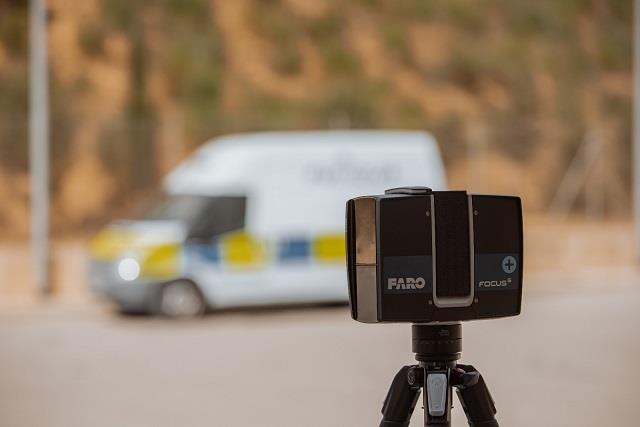While the Malta Police Forensic Science Laboratory (MPFSL) adheres to quality standards recognised at a high level, including within the European context, certain elements within the Maltese legal framework can restrict the Forensic Unit's ability to apply its full expertise, police inspector Charlot Casha said.
These constraints may prevent the lab from operating at its highest capacity and advancing forensic science practices as effectively as possible, he told The Malta Independent on Sunday in an interview.
Despite most people associating the Forensics Unit in Malta with homicides due to influence from television and films, its role, though very discreet and behind the scenes, is far more widespread and advanced than Hollywood's dusting for fingerprints, Casha said.
Casha has 29 years of experience under his belt. Before being promoted to the rank of police inspector, he was specialised as a Scene of Crime officer/manager and Ballistics specialist. Ten years ago he was given the responsibility as the officer in charge of the MPFSL. Apart from being the current head of the MPFSL and the manager of the serious crime scenes, he was also recently nominated and elected as a board member of the European Network of Forensic Science Institutes (ENFSI), the sole forensics network recognised by the European Commission. Because of this, the ENFSI is the "gold standard" of the EU, with only 73 other forensic labs in 39 EU member states making the quality standard cut, including the MPFSL, which is a full member.
In addition to his direct role in forensic investigations, Casha takes an active role in mentoring his younger colleagues. His approach to training is collaborative: "I always aim to teach and encourage others to keep on learning, and I keep on learning from them too." He added that several of his colleagues have now developed their specialisations to the point where they can manage assignments independently, without requiring his direct oversight. Also, there is a team that has even become instrumental in supporting the overall management of MPFSL.

Photos provided by the interviewee
Casha emphasises that "no case should be considered more important than another; each one has its own story to tell. One of the first lessons I instil, especially when dealing with sensitive or high-stress scenes, is to approach the case objectively - without personal attachment. It's important to avoid emotional reactions. Beyond focusing on our duty, I encourage a mindset of, 'what can we learn here?'"
Casha acknowledged that maintaining objectivity isn't always easy. "Of course, everyone has their soft spots, even after 29 years on the job." He recalled responding to a road accident involving a toddler close in age to his own child at the time, adding, "even just talking about it now gives me goosebumps".
Furthermore, Casha also opted to describe Maltese forensic officers on a wider basis than simply "talented". "Rather than talent, I have certain colleagues that are not highly qualified academically, but they have a lot of logical reasoning and experience. They are trained in certain areas, but they have the best thing: they are good researchers. And in our field, you need to have a passion for research." Ultimately, "if you have the passion, nothing is impossible. You could say that sometimes the research passion may be considered much better than the training itself," he said.
"Let's talk about what forensics is. If we have to define the terminology, forensics in brief is the application of sciences, technology and scientific methodologies in matters related to criminal investigations. Forensics is a fact-finding mission to discover the truth. So, it is a science-driven investigation conducted within the framework of the justice system," Casha said.
"Our forensic lab applies various scientific methods to conduct investigations and to reconstruct the crime scenes; we do not engage in interrogations or interact directly with victims or suspects, except for any specific forensic sampling. Instead, we serve as the silent witnesses."
Services and specialisations are requested whenever there are scenarios involving physical evidence which require preservation, scientific examination and/or further analysis. This includes not only homicide cases, but any offence under the jurisdiction of the Maltese laws, he said.

"In Malta, a lot of people associate forensic with homicides. But it is not only that. Homicide is just one part of our work. Our day-to-day work spans a wide range, from handling cases as straightforward as vehicle theft, to if necessary, responding to large-scale scenarios, which might also include disasters (God forbid!)." He added that they are also called to look into traffic-related accidents and other fatal accidents.
"Whenever there is a court inquiry, more accurately a magisterial inquiry, the inquiring magistrate appoints experts to preserve and collect evidence, whatever it may be, to investigate what happened in that event. As already pointed out, the aim of the forensic investigations is always to extract the truth," he said.
Casha further explained what puts the forensics laboratory as a separate branch from the police investigation. "By using scientific methods and technology, we obtain scientifically-proven results. We obtain scientific proof of the event, which is more 'precise and rigorous' than a description and testimony of an eye-witness." Despite working behind the scenes over a highly varied number of cases, he confirmed that the MPFSL is "relatively well-equipped".
Casha highlighted forensic DNA analysis as an example of how forensic science in Malta has progressed over the past 15 years, drawing on advancements made since the 1980s. The addition of an outsourced private laboratory located in Malta has further strengthened Malta's capabilities with more advanced DNA analysis tools. While keeping pace with the fast-evolving DNA technology is challenging, there are ongoing plans to set up a MPFSL's own DNA laboratory.
Casha also explained that Malta has developed both the national dactyloscopic data (fingerprint) database and a DNA database, which are linked to the larger network of databases shared among Prüm Convention member states since 2015. Upon obtaining a genetic profile or fingerprints from a suspected individual in Malta, the data is securely digitised and anonymised using hashing and coded identifiers. This data is then uploaded to the database, where a search is conducted across the Prüm network to identify potential matches with other countries' records. In the event of a match, the relevant information is exchanged, and further investigative collaboration is initiated to support the case.
Casha went on to sketch out the Maltese system of criminal investigation. "Whenever there is a report of a crime, which is of a certain scale, generally punishable with over two years of imprisonment, the police will inform the inquiring magistrate on duty. Then it is up to the magistrate to see if a magisterial inquiry is conducted."

"When a magisterial inquiry is initiated, two distinct investigations proceed simultaneously. First, the police conduct an investigation focused on identifying suspects and apprehending the perpetrator/s. Parallel to this, the magistrate leads an independent inquiry on behalf of the court. Acting as the chief investigator, the magistrate's primary role is to gather all the possible evidence to reconstruct the case, ensuring that all the evidence is legally preserved and meets judicial standards, so that eventually it will be used in court during any legal proceedings."
Subsequently, the prosecution requests the magistrate's inquiry report, or procès verbal, to be submitted during the arraignment process. This procedural step is governed by the provisions of the Criminal Code, specifically under Chapter 9 of the Laws of Malta, he said.
"Although at the end of the day, these two parallel investigations are held to serve justice, sometimes there may be lacunas. The police investigation usually would need certain evidence that is most probably being collected by the magisterial investigation. However, in order to obtain this evidence, access it or even communicate with court experts, the police investigators should request the authorisation of the inquiring magistrate." He added that "there are other instances where the law itself dictates how certain procedures should be held even during the police investigations".
"When specialists from the MPFSL are appointed as court experts by a magistrate, their role shifts entirely to that of an impartial expert serving the court," Casha explained. "At this point, we distance ourselves from our role within the police force. The investigations are kept separate, and the police investigators from other police departments must seek the magistrate's authorisation to communicate with MPFSL specialists, as per the legal framework."
Although the Forensic Lab operates under the police structure, it maintains an independent framework with its own Quality Management System, internal policies and standard operating procedures, he said. Additionally, the lab's management system is certified and accredited under the ISO 17025 standards, ensuring that the forensic investigations are conducted to the highest standards. These rigorous procedures are in place to preserve the integrity of the forensic process. Information or evidence can only be shared with explicit authorisation from the magistrate or as mandated by law. This structure reinforces the lab's impartiality and safeguards its independence within the judicial process.
One challenge within the system arises from the provisions of the Criminal Code, which directs the inquiring magistrate to freely appoint experts to recover relevant evidence in relation to a crime. "While the discretion granted to magistrates is essential for ensuring the flexibility and efficiency of the legal process, it can sometimes result in situations where certain experts are favoured based on prior experience, rather than their specific qualifications or competencies in a forensic context. This discretion, while necessary, can occasionally lead to inaccuracies," he explained, noting that such practices may undermine the integrity of the investigative process.
Ultimately, "this highlights the importance of ensuring that appointed experts possess the appropriate forensic specialisation to effectively contribute to the legal process, as their expertise directly impacts the quality and accuracy of the evidence presented," he said.
"There is an important distinction between a general specialist and a forensic expert. A simple example of a profession that highlights the importance of specialisation in forensic contexts could be a photographer. While a general photographer may excel in capturing high-quality images for events or portraits, they may lack the specific training required for forensic photography," he said.
Forensic photography involves capturing precise, detailed images of a crime scene, evidence and injuries, ensuring the photos accurately reflect the scene and maintain the integrity of the evidence. A general photographer might not be familiar with the standards and techniques required to document forensic evidence, such as using scale markers, proper lighting and maintaining chain-of-custody protocols. Without the proper forensic training, the photographs they take might not be admissible in court or could fail to meet the necessary evidentiary standards, Casha added.
The forensic specialisation is vital for ensuring the expert's ability to make the correct connections between the evidence and the crime in question. As a result of this, he noted that there may be occasions when court-appointed experts lack the necessary forensic procedures or legal background, which may hinder their ability to make critical connections between evidence and the crime. This gap in competencies can potentially compromise the effectiveness of the investigation and, in some cases, lead to misinterpretations of key evidence.